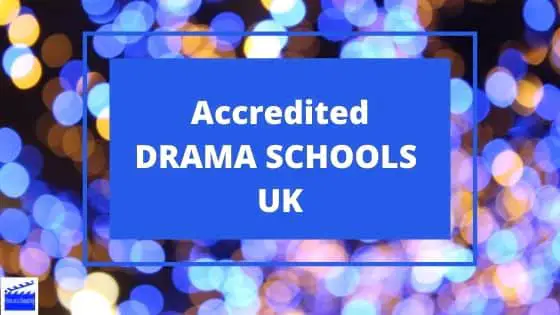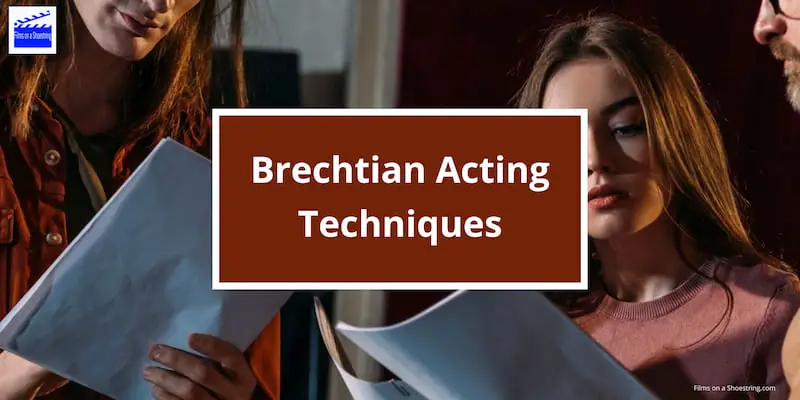If you’re applying to an accredited drama school in the UK, the expense, difficulty of getting a place and impact on your future career means you have to choose carefully.
As part of your research you’ll discover that your chance of getting a place at a top drama school is low. But with the high cost of time and money required, you must ensure the training received is going to have a positive impact on your future career.
8 Top UK Drama Schools
In August 2018, The Stage magazine’s WestEndProducer listed the top drama schools which would seriously help aspiring performers to get in front of top casting directors.
They are:
Top Drama Schools For Straight Actors
- The Royal Academy of Dramatic Arts (RADA)
- London Academy of Music & Dramatic Art (LAMDA)
- Guildhall School of Music & Drama
- Bristol Old Vic Theatre School
Top Drama Schools To Launch A Musical Theatre Career
- Mountview
- Guildford School of Acting (GSA)
- Arts Educational School, London
- Urdang Academy
With thousands of people wanting to secure training places on acting and musical theatre courses each year, only a select few will be given places at these drama schools listed. Approximately 1 in every 100 applicants will be offered a place.
Reputation matters with Casting Directors. That’s not to say these institutions have facilities, teachers and talent not found elsewhere.
Why Reputation Matters
The biggest issue for drama school graduates looking for acting work is access to casting directors. They are the gatekeepers to paid acting work for stage, TV, and film.
Each year, top casting directors and talent agents visit a select number of drama schools to spot up and coming talent at the drama school’s showcase. That’s one way to get on the radar of the right people.
But throughout the year, as casting directors review thousands of submissions for casting calls and select just a few to audition, they take note of the training each actor received.
It’s just part of the decision making process, but can be the factor that gets you in the audition room.
Unfortunately, this means reputation is one of the most important elements you must consider when deciding which drama school to apply for.
It doesn’t mean those places alone have access to the highest quality teaching staff and best training experiences. Many staff work across two or three drama schools. Moreover, some of them may not feel the right fit for you and three years will feel like a lifetime if you are unhappy or desperately short of money throughout.
There is an ever-expanding choice of courses with newer organisations which offer drama and musical theatre training which can be very high quality and affordable.
However, be aware that they lack the reputation which opens the right doors to top-level casting directors. That puts the onus onto you to later work harder to make your career happen – which is possible.
So choosing the best drama school for acting or musical theatre training isn’t straightforward.
It all relies on your funding, ability – and massive dollops of luck. But if you visit a drama school and feel it is a good fit for you, and there is a solid alumnus showing that the previous graduates have gained work, you have important pieces of information for what is ultimately your decision.
Conservatoires In The UK
Conservatoires offer a range of high level musical and drama training, along with other specialisms in the theatre arts profession.
Degree and postgraduate degree courses are among the options available in these elite institutions.
The Conservatoires in the UK are:
- Royal Central School of Speech And Drama
- Trinity Laban Conservatoire of Music and Dance
- London Academy of Music & Dramatic Art (LAMDA)
- Royal Academy of Music
- Guildhall School of Music & Drama
- Royal Birmingham Conservatoire
- Bristol Old Vic Theatre School
- Royal College of Music
- Leeds College of Music
- Royal Northern College of Music
- The Royal Conservatoire of Scotland
- Royal Welsh College of Music and Drama
Is Lamda or Rada better?
RADA has few places for its three year degree so is harder to get in to. But it’s also very difficult to win a place at LAMDA. Your chances of receiving a place at both institutions is almost non-existent, so asking this question suggests you have a lot more research to do.
Drama Schools Accredited by CDMT
The Council for Dance, Drama and Musical Theatre (CDMT) provides quality assurance for their members in the professional dance, drama and musical theatre industries.
Drama schools in the UK accredited by the CDMT:
- ALRA – Academy of Live and Recorded Arts
- ArtsEd
- Drama Studio London
- Guildford School of Acting
- Italia Conti Avondale – Clapham (Acting)
- Liverpool Institute for Performing Arts
- Mountview
- The Oxford School of Drama
CDMT Accredited Musical Theatre Schools and Colleges:
- ArtsEd
- Bird College
- Bodywork Company Performing Arts Cambridge UK
- D&B Academy of Performing Arts
- Guildford School of Acting
- Italia Conti Academy of Theatre Arts – Barbican
- Italia Conti Arts Centre – Guildhall
- Laine Theatre Arts Ltd.
- Liverpool Theatre School
- London Studio Centre
- Masters Performing Arts College
- Midlands Academy of Dance and Drama
- Millennium Performing Arts
- Mountview Academy of Theatre Arts
- Performers College
- SLP College
- Stella Mann College
- The Hammond
- The MGA Academy of Performing Arts
- Urdang Academy
UK Dance Schools and Colleges with CDMT accreditation:
- Bodywork Company Performing Arts Cambridge UK
- Creative Academy
- Elmhurst Ballet School
- English National Ballet School
- Italia Conti Academy of Theatre Arts
- KS Dance Ltd
- Laine Theatre Arts Ltd.
- Liverpool Institute for Performing Arts
- London Studio Centre
- Millennium Performing Arts
- Northern Ballet School
- Performers College
- SLP College
- Stella Mann College
- The Hammond
- The MGA Academy
- Tring Park School for the Performing Arts
- Urdang Academy
In addition, CDMT has a list of Recognised Schools, which you search for on their website based on location.
“A Recognised School is a pre or non-vocational dance, drama or musical theatre school that is committed to putting the safety of its pupils first and meets the following nine requirements of good professional practice.”
CDMT website, 2020
Finally, the CDMT also has a number of affiliates listed, which we have included at the end of this article.
Drama Schools Recommended By NAPM
The forum ‘Not a pushy mum’ (NAPM) is repeatedly recommended in our articles.
The young people and their parents contributing to the forum have genuine experience of working and training in the acting and musical theatre industry.
Furthermore, the annual round of auditions for training places draw existing and new members to support and encourage each other. You can find out everything from what to wear to a drama school audition to locating nearby places to board.
Popular destinations for drama and musical theatre students discussed in the forum, include:
- Bird College
- Laine Theatre Arts
- Italia Conti Academy of Theatre Arts
- Rose Bruford College of Theatre and Performance
- Liverpool Institute for Performing Arts (LIPA)
- Emil Dale
- East 15 Acting School
- Chichester University
- University of Central Lancaster (UCLAN)
- Academy of Live and Recorded Arts (ALRA)
- Midlands Academy of Dance and Drama (MADD College)
- Evolution Foundation College
Some of these institutions have a mixed response from forum contributors, while others are wholeheartedly recommended. It’s a good reminder that you must do detailed and thorough research before applying.
But don’t think the applications will be a breeze for any drama school – the competition for entry will be severe at any institution with high-quality training valued by casting directors.
Plus, you must work hard throughout your studies. You could find yourself in classes and rehearsals for up to 40 hours a week.
What is the best drama university in the UK?
Many of the courses already listed in this article are delivered by institutions which are now part of a university. You apply via the UCAS system for the undergraduate courses.
In addition, drama courses are delivered in various guises at most universities and affiliated centres. Some offer acting courses alongside academic studies, while others concentrate on community theatre or wider artistic development areas.
Think carefully before applying to any university drama course, and question what you hope to get out of it. Is it academically based, or focussed on practical training? Perhaps it offers additional course choices which may provide employment for the lean acting periods.
Begin by looking at university prospectus websites and the UCAS website. Unifrog is also helpful if you attend a school or college with a Unifrog subscription.
Those drama courses aimed at producing the next generation of actors maintain strong industry contacts and provide a graduate showcase event. Casting directors are invited to watch and spot new talent, while acting agents attend seeking fresh talent for their books.
Many of the actors you see on screen studied drama or other subjects at university, but learnt most of their acting craft in the drama societies. Acting in dozens of student plays over three years gives you a chance to experiment and develop your skills.
Also, the list of Footlights alumni would suggest a TV acting career is well served by a degree in any subject at Cambridge. Perhaps this reflects the amount of financial support you need in the first few years of working as an actor, or the level of contacts required.
Emerging Institutions
There are a number of emerging institutions providing industry focussed training. Emil Dale, Musical Theatre Academy (The MTA) and Fourth Monkey are good examples.
New institutions face the difficulty of both breaking through traditional bias of some casting directors and attracting the students likely to succeed in a very tough industry (wealthy and well connected) .
For prospective applicants, it’s hard to assess the quality of training on offer especially when there hasn’t been time to establish a list of ‘names’ in the alumni.
It is worth researching and visiting some of these newer, alternative options.
Fourth Monkey has spent the past ten years getting established, finding permanent premises, developing training programmes and picking up nominations for its Edinburgh Fringe shows.
They continue to be creative and disruptive, now offering
- No audition fees
- One single audition day so you don’t incur the expense of recalls
- An accelerated two year degree
- A one year training course structured for work & study balance
- Accreditation by Falmouth University
- Lower fees than typically charged elsewhere
- Scholarships, in partnership with The Stage
The training won’t open the same elite doors as 3 years at RADA does, but that’s the experience of most drama school graduates anyway.
Nor will you find it an easy option to access. Fourth Monkey has a strong reputation, especially in communities unrepresented by most top drama schools. Combined with its philosophy of affordable immersive training, demand easily outstrips supply.
What Is An Accredited Drama School?
In the past, most drama courses were offered by private institutions. Institutions gained accreditation from Drama UK if they met the set standards, and paid subscriptions to the monitoring body.
However, the great majority of acting schools now offer degrees which are monitored by the UK government’s Quality Assurance Agency for Higher Education (QAA).
“We safeguard standards and improve the quality of UK higher education wherever it is delivered around the world. We check that students get the higher education they are entitled to expect.”
QAA website, 2020
Drama UK was disbanded in 2016, but the Council for Dance, Drama and Musical Theatre (CDMT) still exists. Established in 1979, it was known as the Council for Dance Education and Training (CDET) until March 2018.
“CDMT provides quality assurance for the professional dance, drama and musical theatre industries. It is the first point of contact for those seeking information on education, training and assessment in the UK. CDMT negotiates with government bodies, as well as national and international agencies on behalf of our member organisations.”
CDMT website, 2020
So when you research drama schools, start by checking the QAA’s quality assurance report for the institution and registration with the CDMT.
“CDMT’s accreditation reports are used by Ofsted as relevant evidence during their inspection process. CDMT is also recognised as an accrediting authority by the Higher Education Statistics Agency (HESA) and is included in their list of accrediting bodies for the Key Information Set.”
CDMT website, 2020
CDMT Affiliate Courses
We listed above the institutions accredited by the CDMT, and mentioned their Recognised Schools status.
In addition, the CDMT has a section on their website dedicated to affiliate courses and institutions.
CDMT Affiliate Performing Arts Courses:
- Mandy Ellen Performing Arts College, Maidstone
- Reynolds Performing Arts, Dartford
- The Centre Performing Arts College (The Centre PAC), Maidstone
- Wac Arts, London NW3
- Wilkes Academy of Performing Arts, Swindon
“CDMT Affiliate Performing Arts Courses vary in content, purpose, style and qualifications offered. Each course listed below is unique and has its own curriculum specifically tailored to meet the needs of the course objectives.”
CDMT website 2020
CDMT Affiliate Access to Professional Training courses:
- Jason Thomas Performing Arts, Truro
“CDMT quality assures one-year full-time courses which prepare young people for professional training in the performing arts. These courses must evidence that at least 75% of graduates (averaged over previous three years) have been offered a place at a CDMT Accredited School, or an other institution recognised by the CDMT, for further professional training.”
CDMT website, 2020
CDMT Accredited Professional Schools:
- Cambridge Performing Arts at Bodywork Studios
- Italia Conti Academy of Theatre Arts
- Laine Theatre Arts Ltd
- Liverpool Institute of Performing Arts
- Liverpool Theatre School and College
- London Studio Centre
- Midlands Academy of Dance and Drama
- Millennium Performing Arts
- Performers College
- SLP College
- Urdang Academy
“Accredited Professional Schools have have undertaken institutional quality assurance by the CDMT and are committed to delivering the highest standards in their Access to Professional Training Courses.”
CDMT website, 2020
Drama Colleges For 16-Year-Olds
This article is aimed at those over the age of 18 seeking a course at drama school. But many people decide to leave school after GCSEs and seek immediate training at a drama college or school.
Firstly, think carefully about following this route. Performing arts careers are precarious and rarely bring in earnings equivalent to full-time minimum wage income. A-levels or a technical qualification might later be more useful to pay your bills when you’re having difficulties even getting invited to an audition room. You can still attend a summer course for the performing arts or join a local youth theatre.
Secondly, look at one of the performing arts colleges even if it means boarding onsite or with a nearby family. Tring Park School, The Hammond School, Italia Conti, Emil Dale, the Wilkes Academy, and the Sylvia Young Theatre School are some of your options. They are expensive but some scholarships are available if your talent is exceptional.
Finally, high level intensive, industry-focussed local training might exist in your own area. Local sixth form colleges, however, usually offer performing arts courses targeted to national qualifications rather than industry training.
At each facility you visit, ask a lot of questions about what happened to previous cohorts from any course you offered. Also, if you are given the name of a past student who became successful, do a bit of online searching. See if the course was a key part of entering their career or whether they found an alternative route into the industry.
Even if you are desperate to act, you don’t need to drop everything else at 16. There is nothing stopping you doing A-Levels and acting in your spare time to get experience and IMDb credits. Keep yourself and your money safe though!
Do You Have Acting Experience?
While experience as an actor isn’t necessary before you apply to drama school, you can get into acting without drama school.
Experience of the industry will help clarify whether you can cope with the emotional roller-coaster of castings which end in silence. Plus you’ll discover how much time on set is spent literally waiting.
Our article How to be a teenage actor signposts some of the ways you can get experience – and furthermore the pitfalls to avoid. The process is much the same for older aspiring actors too.





